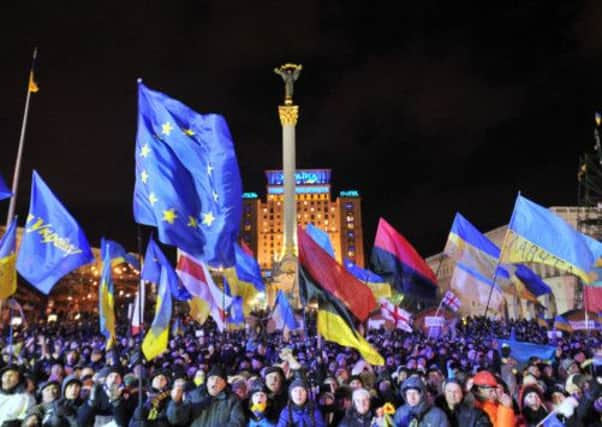Ukraine: Cracks begin to show in parliament


With protesters blockading the centre of the capital, president Viktor Yanukovich flew to China yesterday on a three-day state visit seeking financial support.
He left his country in turmoil, torn once more between East and West in what his opponents hope will become a re-run of the 2004-5 Orange Revolution that overthrew the post-Soviet order.
Advertisement
Hide AdAdvertisement
Hide AdMPs rejected an opposition demand for a vote of no confidence in the government of premier Mykola Azarov, while outside riot police squared up to several thousand pro-EU protesters in freezing conditions.
Most pro-government deputies, however, either abstained or did not vote, a warning to Mr Azarov of discontent in his ranks. At least two members of Mr Yanukovich’s Regions Party defected to the opposition.
The government’s 21 November decision to reject a deal on closer trade ties and integration with the EU has again laid bare a split in world view between Ukraine’s Russian-speaking east and Ukrainian-speaking west.
Protesters see the rejection of the EU trade deal as a shift from the European mainstream and back into the orbit of Moscow.
Some 350,000 people took to the streets of Kiev on Sunday in the biggest show of popular anger since the Orange Revolution, when huge demonstrations forced the annulment of a fraudulent presidential election won by Mr Yanukovich.
Striking a conciliatory tone, Mr Azarov apologised for the use of police force against protesters over the weekend and pleaded with opposition leaders not to repeat the revolution.
“We reach out our hand to you; push away the intriguers seeking power trying to repeat the scenario of 2004,” Mr Azarov told MPs. He spoke in Russian, straining to be heard over opposition chants demanding he address them in Ukrainian.
“In the name of the government,” Mr Azarov said, “I want to apologise for the actions of law enforcement agencies on Independence Square.”
Advertisement
Hide AdAdvertisement
Hide AdConfrontation on the streets adds to a risk of financial turmoil. Ukraine faces gas bills and debt repayments next year of more than £10 billion.
As evening fell, around 1,000 protesters marched on Mr Yanukovich’s presidential office, singing the national anthem.
“The Orange Revolution laid the foundation for this,” said self-employed businessman Yegor Kitov, 45. “But this movement is stronger because, while then it was political parties that were organising the people, now we are organising ourselves.”
Unlike 2004, the opposition lacks a unified leadership. Pro-EU liberals share the stage with far-right nationalists, so far without a leader in the mould of jailed former premier Yulia Tymoshenko.
She lost a presidential election to Mr Yanukovich in 2010 and was later jailed over a gas deal with Russia. Kiev has rejected a request for her to travel to Germany for medical treatment. She announced a hunger strike in prison last week.
In her absence, the protests have thrown a spotlight on world boxing heavyweight champion Vitaly Klitschko, who leads the opposition Udar (Punch) party. “I urge Yanukovich to resign!” he told MPs. “Don’t do anything stupid. Don’t drive yourself and the country into a dead-end.”